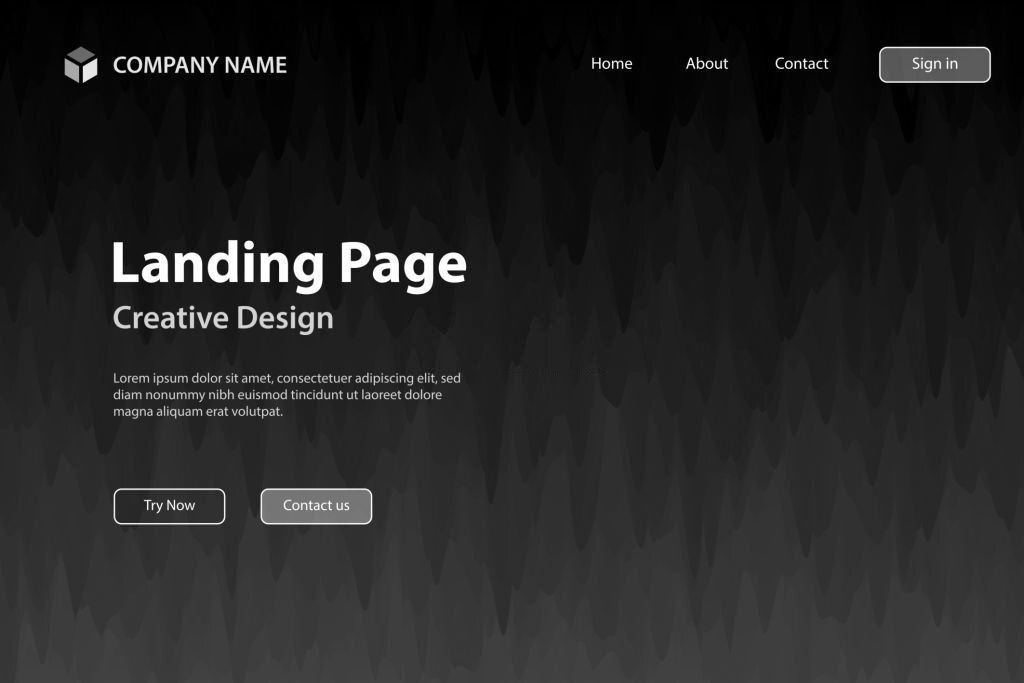Landing pages matter, and making it clear where your business operates is particularly critical for small businesses trying to compete with national brands. A great local landing page should help your business make more money in two ways.
- Firstly, it should rank organically in search results.
- Secondly, it should convert page visitors into customers or leads.
For example, last week I came home and I was hungry; so after a quick Google search, I ended up landing on a Domino’s Pizza landing page.
The page told me the following: “There’s a Domino’s 10 minutes away from your house. There are also other Domino’s locations in Chicago. Oh by the way, are some coupons for Domino’s pizza incase you want to order.” I was sold. I ordered a pizza and it arrived in 30 minutes, piping hot and delicious.
On the flip side, I once found a bicycle I liked while searching online for the query “Chicago bike shop.” The only issue was the bike was sold at a store outside of Chicago in Bollingbrook! It ranked for Chicago terms anyway because its location wasn’t made clear on its landing page. Needless to say, I didn’t buy the company’s bike.
So, how do you create the perfect local landing pages that lead potential customers to your business?
Start with the Four Ps
Before you set out on your journey to create good local landing pages, let’s throw back to Marketing 101. You probably remember the Four Ps—the granddaddy of all marketing theory and advice.
1. Product:
The core of all marketing efforts comes down to what you offer. It doesn’t matter if your business is literally across the street from my house—if you can’t convince me that this product or service is something I need, something that is better than the alternatives, then I’m not going to buy. I need information about what exactly is being offered.
2. Price:
Price can go a lot of different directions and isn’t always a necessary factor when it comes to making a sale. Take Digital Third Coast, for instance—we don’t have listed prices, because every project is custom built. But what we do emphasize is value.
We focus on making the most of client budgets by focusing on ROI. You need to make it clear that the customer is getting value—be that by saving money, avoiding aggravation, saving time, etc. Price isn’t always a matter of money.
3. Promotion:
Once we’ve established our product and the value we provide, it becomes a matter of crafting the right message and delivering it to the right person through our digital marketing efforts. If you’re reading this, you’re well familiar with this concept already—we’re creating these pages so we can promote and drive traffic from Google.
4. Place:
It goes without saying that if we’re talking about local pages, we need to make it very clear our location or area of service.
Any good marketer will tell you that all four of these need to be well-defined and executed well in order to succeed. With that in mind, let’s dive into applying these principles to real life and talk about how you can create great pages for your local business.
Creating a Quality Website for Local Search
There’s three main types of pages we want to focus on when creating a local site. Each page has its own role in improving your local SEO results and driving PPC conversions.
- Home Page: An overview of everything your business does.
- Service Pages: An overview of a specific service or problem (i.e. “water heater replacement” in the case of a plumber).
- Location Pages: An overview of a specific area you service (i.e. “Wicker Park Plumber”).
Examples of Local Landing Pages
For this example I did a local search for “Chicago plumber,” and found a few websites that embody the key principles of great local landing pages. These companies have the core ideas in place and thus, they rank well in local searches.
#1. Home Page: Baethke & Son Plumbing
This home page is very straightforward and gets a lot of the local SEO basics right. They aren’t a large company by any stretch, much smaller than someone like Roto-Rooter, but they appear prominently in local search results. Why does this local business rank so well?
Their area of service is very, very clear— ”Chicago Emergency Plumber” is written in the title tag, and “Your Trusted Local Chicago Plumbing Company” is the page’s header 1 tag. These meta tags are sending strong signals to Google that this company is located and serves customers in the city of Chicago.
Page Content
Page content matters greatly for organic ranking. On the homepage there are multiple sections of localized paragraph content to further the point of emphasis on Chicago being their area of service. They make use of key service terms like “residential plumbing” and “water heater services.”
The landing page also features a phone number with an area code local to Chicago, and contains a Chicago address in the footer of the site. There’s no apparent keyword stuffing within the landing page’s content, and they balance variety and and relevancy while driving organic results.
Easy Navigation
Easy Navigation is a total blessing. Need to call or request an appointment? The landing page has you covered. There’s also a large button leading to a list of services and specialties that they offer. It’s a very basic website, but it’s very easy to navigate.
Keep in mind with a lot of local services, like plumbing, your potential customers might not be the most tech-savvy, and they’re more likely to be on mobile. Follow the principle of Don’t Make Me Think—a grade schooler should be able to understand how to interact with your site.
Easy to Convert
With a BIG phone number in the top corner when the web page loads, and you can schedule an appointment online instantly. Make yourself as easy as possible to get in touch with. There’s yet another form down the page.
As a local SEO analyst I love seeing multiple contact options available, like phone number, email addresses, social media, and physical address. The easier it is for your target audience to find ways to reach out to you, the more effective your landing page will be to generate leads.
Overall, this website covered a lot of the key elements by making its services clear, service area and location clear, and making it easy for visitors to get in touch with them.
Service Page: Baethke Plumbing
We once again reference our new plumbing friends with a pretty solid example of how to make a service-focused page—this one addresses the exciting world of faucet replacement! So why does this work?
Knowledge of the service:
One of the key things when it comes to your service pages is showing people that you’re an expert on the given query. Here they make mention of both repairing a broken faucet or upgrading to a better model, as well as their certifications and completion of previous jobs. You get the sense to expect nothing but high quality service and craftsmanship.
The right keywords:
There is good usage of keywords like “Chicago” and “faucet replacement” on this particular local landing page. From an SEO perspective, these keywords are used a few times, but not enough to be considered spammy. The content also provides relevant context to the user which helps them to rank in organic search engine results.
Call to action:
They have a form top of the fold, which is easily accessible. Also, the phone number is still prominent in the header. This will help drive customers further down the sales funnel to your sales team.
#2. Location-Focused Page: Roto-Rooter Plumbing & Water Cleanup
Ranking well within Chicago’s city limits is one thing, but since these companies can travel to most customers in the Chicagoland area, they need to rank well to a broader geographic region.
To do so, they need a local page for the customers searching for a plumber within their own suburb–one that’s close by, or can easily travel to them to help immediately–Roto-Rooter does a great job of representing their services in the Chicago suburbs with individual location-focused pages.
Here’s why these pages have the ability to rank:
Specific Location Information:
This page targets residents of “Arlington Heights” (a suburb outside of Chicago). From an SEO perspective, we see the suburb’s name used in the page’s title tag, the header tag and a few other times on the page making.
There is additional hyperlocal information scattered throughout the page, such as names of counties, an physical address, as well as a manager name for this region and a relevant phone number with a local area code (847).
All of this information is relevant to potential customers living in Arlington Heights that need a plumber to travel to their area for a service.
Location Shown on Map:
We very clearly see the area they’re referring to. If you service the whole town/neighborhood and some surrounding communities, you might want to use a service area map like the map shown on this page.
Best Practices Continued:
There’s the major selling points, more information on complimentary services, there are some reviews on the page, there is also a prominently displayed phone number and contact form—all things we called out earlier also apply to this page.
Remember the Four Ps of Location-Based Landing Pages
Making great local pages can be time-consuming, but it’s not too hard if you approach it the right way!
Your website’s home page needs to be broad and focus on the main area of your business’s expertise. While your website’s service pages need to demonstrate the various offerings you have to deliver that expertise. A good landing page will have location and service area in mind, as well as examples of your company’s history and knowledge of that particular area.
Keep the classic four Ps in mind on each type of page.
- Product: Make it clear what you’re offering and where you’re offering it at by fleshing out service and location pages that clearly target your customers.
- Promotion: Clear contact information drives customers to convert. That’s the goal of all this promotion.
- Price: Emphasize value—you don’t need to state a price, but think about your consumer and what they value most. Speak to their needs.
- Place: Make it clear you not only operate in a certain area, but have a history of expertise in the given area.
These examples should have you well on your way to creating local landing pages, but if you’re curious to really step up the game and learn more, check out this complimentary blog on how to overcome local SEO challenges, boost your local SEO presence and help your business grow. Contact us today







